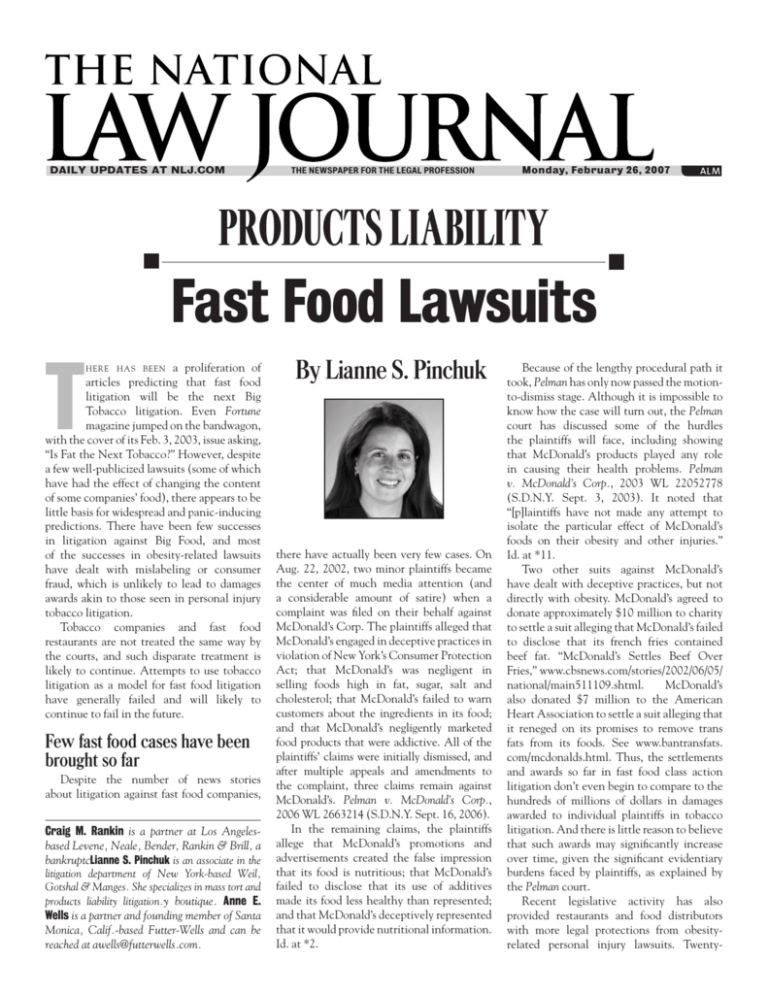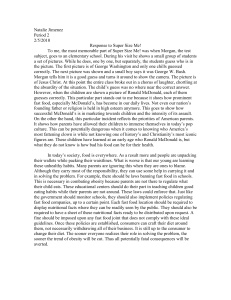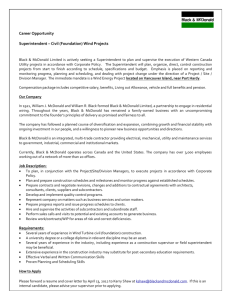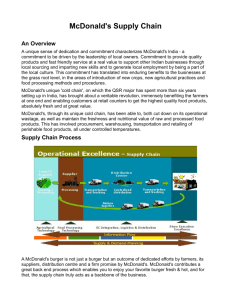
daily updates at nlj.com
the newspaper for the legal profession
Monday, February 26, 2007
products liability
Fast Food Lawsuits
T
a proliferation of
articles predicting that fast food
litigation will be the next Big
­Tobacco litigation. Even Fortune
magazine jumped on the bandwagon,
with the cover of its Feb. 3, 2003, issue asking,
“Is Fat the Next Tobacco?” However, despite
a few well-publicized lawsuits (some of which
have had the effect of changing the content
of some companies’ food), there appears to be
little basis for widespread and panic-inducing
predictions. There have been few successes
in litigation against Big Food, and most
of the successes in obesity-related lawsuits
have dealt with mislabeling or consumer
fraud, which is unlikely to lead to damages
awards akin to those seen in personal injury
tobacco litigation.
Tobacco companies and fast food
restaurants are not treated the same way by
the courts, and such disparate treatment is
likely to continue. Attempts to use tobacco
litigation as a model for fast food litigation
have generally failed and will likely to
continue to fail in the future.
here has been
Few fast food cases have been
brought so far
Despite the number of news stories
about litigation against fast food companies,
Craig M. Rankin is a partner at Los Angelesbased Levene, Neale, Bender, Rankin & Brill, a
bankruptcLianne S. Pinchuk is an associate in the
litigation department of New York-based Weil,
Gotshal & Manges. She specializes in mass tort and
products liability litigation.y boutique. Anne E.
Wells is a partner and founding member of Santa
Monica, Calif.-based Futter-Wells and can be
reached at awells@futterwells.com.
By Lianne S. Pinchuk
there have actually been very few cases. On
Aug. 22, 2002, two minor plaintiffs became
the center of much media attention (and
a considerable amount of satire) when a
complaint was filed on their behalf against
McDonald’s Corp. The plaintiffs alleged that
McDonald’s engaged in deceptive practices in
violation of New York’s Consumer Protection
Act; that McDonald’s was negligent in
selling foods high in fat, sugar, salt and
cholesterol; that McDonald’s failed to warn
customers about the ingredients in its food;
and that McDonald’s negligently marketed
food products that were addictive. All of the
plaintiffs’ claims were ­initially dismissed, and
after multiple appeals and amendments to
the complaint, three claims remain against
McDonald’s. Pelman v. McDonald’s Corp.,
2006 WL 2663214 (S.D.N.Y. Sept. 16, 2006).
In the remaining claims, the plaintiffs
allege that McDonald’s promotions and
advertisements created the false impression
that its food is nutritious; that McDonald’s
failed to disclose that its use of additives
made its food less healthy than represented;
and that McDonald’s deceptively represented
that it would provide nutritional information.
Id. at *2.
Because of the lengthy procedural path it
took, Pelman has only now passed the motionto-dismiss stage. Although it is impossible to
know how the case will turn out, the Pelman
court has discussed some of the hurdles
the plaintiffs will face, including showing
that McDonald’s products played any role
in causing their health problems. Pelman
v. McDonald’s Corp., 2003 WL 22052778
(S.D.N.Y. Sept. 3, 2003). It noted that
“[p]lain­tiffs have not made any attempt to
isolate the particular effect of McDonald’s
foods on their obesity and other injuries.”
Id. at *11.
Two other suits against McDonald’s
have dealt with deceptive practices, but not
directly with obesity. McDonald’s agreed to
donate approximately $10 million to charity
to settle a suit alleging that McDonald’s failed
to disclose that its french fries contained
beef fat. “McDonald’s Settles Beef Over
Fries,” www.cbs­news.com/sto­ries/2002/06/05/
national/main511109.shtml.
McDonald’s
also donated $7 million to the American
Heart Association to settle a suit alleging that
it reneged on its promises to remove trans
fats from its foods. See www.bantransfats.
com/mcdonalds.html. Thus, the settlements
and awards so far in fast food class action
litigation don’t even begin to compare to the
hundreds of millions of dollars in damages
awarded to individual plaintiffs in tobacco
litigation. And there is little reason to believe
that such awards may significantly increase
over time, given the significant evidentiary
burdens faced by plaintiffs, as explained by
the Pelman court.
Recent legislative activity has also
provided restaurants and food distributors
with more legal protections from obesityrelated personal injury lawsuits. Twenty-
Monday, February 26, 2007
The National Law Journal
three states have enacted laws that provide
at least some protection or immunity to
food companies faced with the threat of
obesity lawsuits.
Although there has not been any obesityrelated litigation in most states, some
have nevertheless enacted the statutes as
protective measures. Louisiana started the
trend by enacting legislation in 2003. La.
Rev. Stat. § 9:2799.6: “Limitation of liability
for damages from long-term consumption
of food and nonalcoholic beverages.” Such
statutes generally provide some immunity
from liability arising out of claims concerning
weight gain, obesity and obesity-related
health problems. Florida’s statute, Fla Stat. ch.
§ 768.37, provides that no food manufacturer,
distributor or seller “shall be subject to civil
liability for personal injury or wrongful death
to the extent such liability is premised upon
a person’s weight gain or obesity, or a health
condition related to weight gain or obesity.”
Some laws mandate that food products may
not be classified as defective and unreasonably
dangerous for products liability purposes.
Like the other states’ statutes, Florida’s
does not limit liability if a food company
fails to provide legally required nutritional
information or has provided materially false or
misleading information. Claims of deceptive
practices, consumer fraud or mislabeling
against food companies are traditionally
allowed under state deceptive trade practices
statutes and are explicitly carved out of the
laws that otherwise immunize food companies
from obesity-related claims.
Following the various state statutes, the
federal government sought to jump on the
bandwagon. Republicans in Congress have
thrice proposed federal legislation protecting
the food industry from “frivolous” suits. The
Personal Responsibility in Food Consumption
Act, H.R. 339 (commonly referred to as the
“Cheeseburger Act”), was first introduced in
2004 and was passed by the House in March
2004. Its purpose was “to prevent legislative
and regulatory functions from being usurped
by civil liability actions brought or continued
against food manufacturers, marketers,
distributors, advertisers, sellers, and trade
associations for claims of injury relating to a
person’s weight gain, obesity, or any health
condition associated with weight gain or
obesity.” The Bush administration issued
a statement of support, stating that “[f]ood
manufacturers should not be held liable for
injury because of a person’s consumption
of legal, unadulterated food and a person’s
weight gain or obesity.” State­ment of
Administration Policy, March 10, 2004,
available at www.whitehouse.gov. H.R. 339
passed, 276-139.
The
bill
was
reintroduced
by
Representative Ric Keller, R-Fla, in 2005
as H.R. 554 and on Oct. 19, 2005, was
again passed by the House, this time with
a vote of 306-120. The White House again
issued a Statement of Administration Policy
supporting H.R. 554. Neither bill was passed
by the Senate. Prior to H.R. 554’s vote
in the House, the Senate introduced the
Commonsense Consumption Act, S. 908.
S. 908 was introduced by Senator Mitch
McConnell, R-Ky., in April 2005. It never
made it out of committee. Given the recent
shift of power in the federal government, it is
unlikely that additional statutory protections
will be provided to the fast food industry.
Attempts to use
tobacco litigation
as a model for fast
food litigation have
generally failed and
will likely continue to fail.
Inherent-danger standard
would not apply to fast food
The state “cheeseburger bills,” however,
provide protections to fast food companies
that were not afforded to tobacco companies.
Unlike tobacco, which is dangerous even
when used as intended and in moderation,
fast food is not inherently dangerous. Even
Philip Morris has agreed that cigarette
smoking is inherently dangerous. Haglund v.
Philip Morris, 446 Mass. 741 (2006). Thus,
most courts facing fast food litigation have
not allowed personal injury claims seeking
large damage awards.
Anyone who saw documentary filmmaker
Morgan Spurlock’s 2004 movie Super-Size Me
in which he gorges himself on McDonald’s
food daily for 30 days to demonstrate its
dangers may argue that McDonald’s food can
be, like tobacco, dangerous even when used
as intended. However, following Super-Size
Me, the documentary Me and Mickey D was
released, showing a filmmaker who lost 36
pounds by eating at McDonald’s three times
a day, but choosing lower-calorie foods than
those chosen by Spurlock. Moreover, most of
us have snacked periodically at a McDonald’s
without any negative health effects, whereas
smoking even periodically has demonstrably
detrimental effects to one’s health. Because
the actual differences between cigarettes and
fast food will be known to jurors (and
judges), the legal landscape faced by fast food
companies is clearly more favorable than that
faced by tobacco companies.
The state laws immunizing food companies
from obesity lawsuits also provide a different
legal landscape than the one in tobacco
cases. That difference does not mean that fast
food companies will be forever immune from
all liability; the protections against personal
injury suits mean that plaintiffs are likely
to transform their claims into false labeling
and consumer fraud claims. Big Food is likely
to face increasing claims under some state
consumer fraud laws, but damages under such
laws are unlikely to match or surpass those
awarded in tobacco cases.
Despite the lack of success of obesity- related
personal injury cases thus far, it is important
to remember that when allegations were
first made against tobacco companies, the
possibility of large verdicts seemed remote.
It was only once the litigation reached
the discovery phase and negative internal
documents were revealed that large plaintiffs’
verdicts be­came possible. The Big Food cases
to date have generally not led to discovery,
and only Big Food itself knows what damning
documents may exist. If they do exist and
are discovered by plaintiffs’ lawyers, they
may provide ammunition for more suits and
increasing verdicts. Right now, however,
fast food companies are enjoying more
protections than tobacco companies ever did,
and it appears that Big Food is not the next
Big Tobacco. nlj
This article is reprinted with permission from the
February 26, 2007 edition of the National Law
Journal. © 2007 ALM Properties, Inc. All rights
reserved. Further duplication without permission
is prohibited. For information, contact ALM Reprint Department at 800-888-8300 x6111 or visit
www.almreprints.com. #005-03-07-0004









